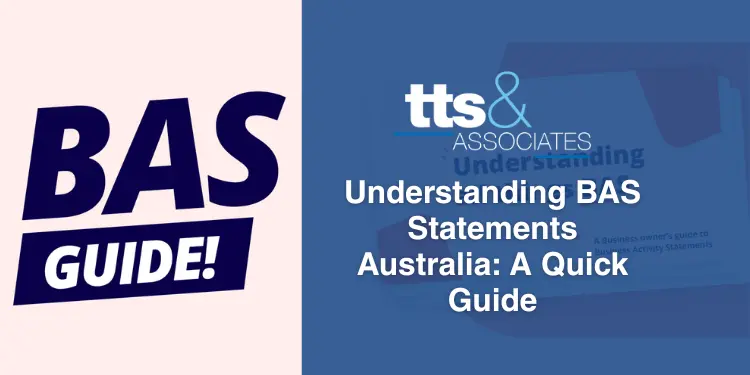“BAS statements Australia” refers to the Business Activity Statements businesses lodge with the ATO to report and pay taxes during the year. While the form looks simple, it concentrates critical obligations—GST, PAYG withholding and PAYG instalments—into one deadline. Understanding how BAS statements work in the Australian context helps you avoid penalties and manage cash flow confidently (see the ATO BAS overview).

What does a BAS cover?
A BAS aggregates several tax items:
- GST (Goods and Services Tax): Declare GST collected on sales (1A) and claim credits for GST on business purchases (1B). Your G-labels (like G1 total sales) reconcile your sales mix—taxable, GST-free and input-taxed—to the GST payable figure.
- PAYG withholding: If you pay wages, report gross wages (W1) and the tax withheld (W2).
- PAYG instalments: Many profitable businesses pre-pay income tax through quarterly instalments—these show up on your BAS or a separate instalment notice.
- Other items (if relevant): Some industries report luxury car tax, wine equalisation tax or fringe benefits tax instalments.
Who must lodge?
If your GST turnover will be $75,000 or more, you must register for GST and lodge activity statements. Smaller businesses may register voluntarily to claim GST credits. Employers lodge because of PAYG withholding, and profitable businesses may enter PAYG instalments. Even with no transactions in a period, you should lodge a nil BAS by the due date. The ATO’s central BAS page explains who lodges and the forms you’ll see (ATO BAS overview).

How often and when are BAS due?
Lodgment frequency is assigned by the ATO and depends on your size and risk profile:
- Quarterly (common for SMEs): BAS are due the 28th day after quarter-end, with a longer window for the December quarter.
- Monthly (larger or elected): Due 21st of the following month.
The due date on your BAS is authoritative and the ATO applies the “next business day” rule for weekends and public holidays (see ATO BAS due dates). If you lodge through a registered tax/BAS agent, you may receive extra time under the agent program.
The Australian flavour: Simpler BAS for small business
Australia’s Simpler BAS settings mean most small businesses only need to code a few GST fields, reducing friction without changing how much GST is paid. Focus on getting classifications right for taxable, GST-free and input-taxed supplies, and ensure expenses like insurance, government charges and imports are treated correctly. The ATO’s practical ATO Simpler BAS guide is a handy reference.
How BAS fits into cash flow
Because BAS combines multiple taxes, the payment can be chunky. Build a simple forecast:
- Estimate GST on sales vs GST credits each month; the net drives your payment or refund.
- Add PAYG withholding on wages and any PAYG instalment amount.
- Set aside cash weekly so quarter-end isn’t a shock.
If cash is tight, lodge on time and set up a payment plan; timely lodgment helps avoid Failure to Lodge penalties even when you can’t pay in full (see ATO BAS due dates).
Common pain points (and fixes)
- Messy records: Reconcile weekly, attach receipts, and lock in a month-end checklist.
- GST misclassifications: Train your team on GST-free and input-taxed supplies; review exceptions each month.
- Payroll mismatches: Ensure STP totals align to BAS W1/W2; run a payroll report before lodging.
- Forgetting instalment notices: Some quarters you’ll receive a GST or PAYG instalment notice instead of a full BAS—diarise those dates too.
- Relying on paper forms: Move to Online services for business or SBR-enabled software for fewer errors and faster confirmations. Electronic lodgment gives you an instant receipt, helps prefill recurring details, and reduces transposition mistakes that creep in on manual forms. Keep the ATO receipt number, payment reference and a PDF copy of the lodged statement with your period file.
Why work with a BAS accountant?
A registered BAS or tax agent improves accuracy and may access extended lodgment dates. They also liaise with the ATO if queries arise. TTS & Associates explains the benefits in Hire a BAS Agent: Key Benefits for Your Business and shares a practical walkthrough in Online BAS Lodgement: 5 Steps to Hassle-Free Filing—both helpful for building a reliable BAS rhythm.

Helpful resources
- Quarterly BAS Due Dates: Key Lodgement Deadlines – a TTS explainer with planning tips for each quarter.
- BAS Statement Explained: What You Need to Know – our plain-English guide to labels and how the form works.
- ATO BAS overview – official instructions and links to online lodgment (ATO BAS overview).
- BAS due dates – official deadlines and the weekend/public-holiday rule (ATO BAS due dates).
With good systems and a steady routine, BAS statements in Australia become predictable: reconcile, review, lodge, repeat. Put due dates in your calendar, keep your coding tight, and lean on a registered agent when you need support.
General information only – seek professional advice before acting.




